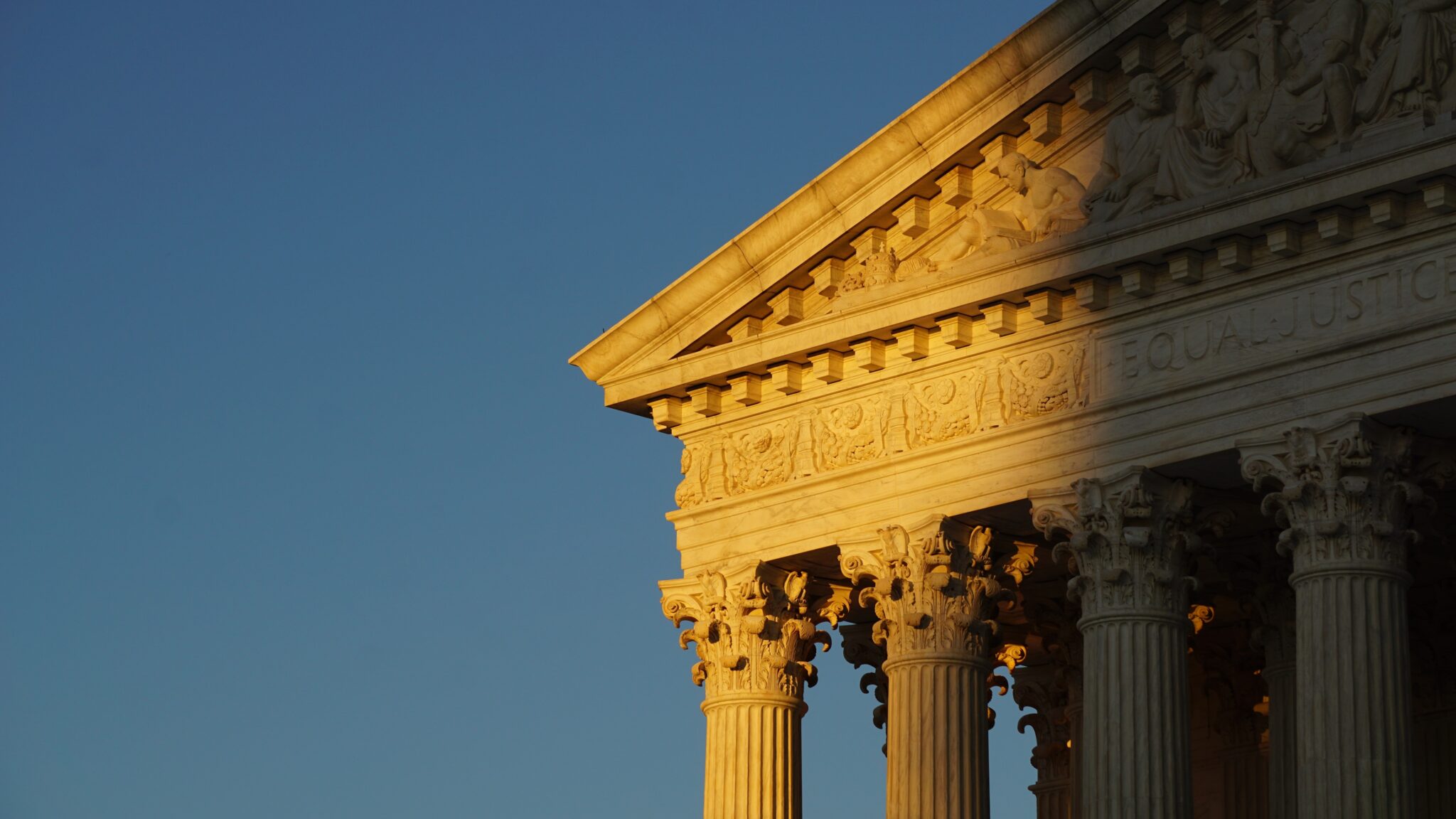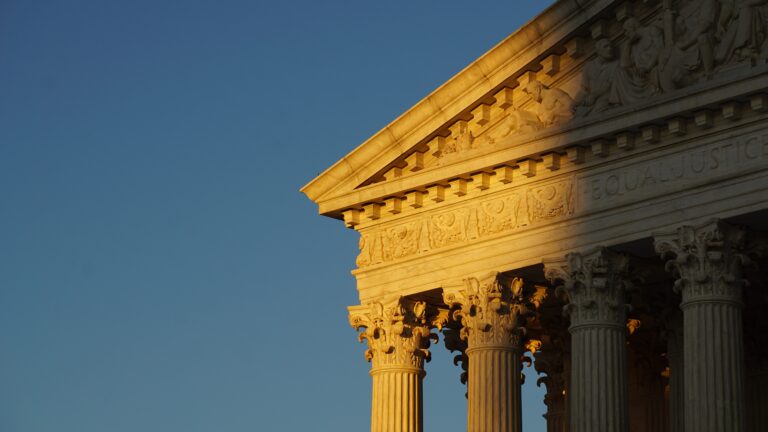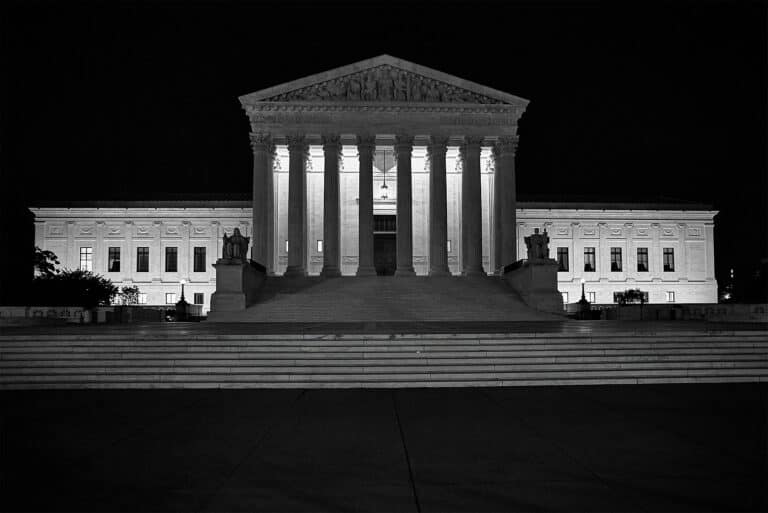
Andrew Strom is a union lawyer based in New York City. He is also an adjunct professor at Brooklyn Law School.
I guess once an anti-union employer group gives itself the Orwellian name, the Coalition for a Democratic Workplace (CDW), it no longer worries about maintaining credibility, but the amicus brief CDW recently filed in the Supreme Court in Loper Bright Enterprises v. Raimondo is hard to take seriously.
Loper Bright is the case where a coalition of business groups and right-wing think tanks are asking the Court to overrule its unanimous 40 year-old decision in Chevron U.S.A. Inc. v. Natural Resources Defense Council, Inc. In Chevron, the Court reaffirmed its longstanding practice of deferring to administrative agencies when they are interpreting the statutes they enforce. As the Court explained in Chevron, this deference means that courts should uphold an agency’s interpretation even if it is not “the reading the court would have reached if the question initially had arisen in a judicial proceeding.” Business groups want the Court to overrule Chevron because they worry that voters don’t like their anti-regulatory agenda, but they can count on Republican appointees on the federal courts to interpret statutes in ways that tie the hands of regulators. One of the agencies that business groups hate the most is the National Labor Relations Board (NLRB). Mostly, this is because the National Labor Relations Act (NLRA), the statute the NLRB administers, declares that it is the policy of the United States to “encourage[e] the practice and procedure of collective bargaining.” Voters elected President Biden to appoint NLRB Members who will effectuate this policy. NLRB decisions are subject to review by the federal courts of appeals, and Donald Trump and George W. Bush stacked those courts with right wing ideologues, many of whom spent their careers defending business interests. With Chevron as the law, a principled right-wing judge will often enforce a pro-worker NLRB order by acknowledging that the Board’s judgment on matters such as “whether a party has violated its duty to confer in good faith is particularly within the expertise of the Board.” If the business lobby can wipe out Chevron, then every Trump and Bush judge will be free to impose their own gloss on the NLRA, denying enforcement of any Board order that they disagree with.
The CDW is a coalition of business groups that initially came together to fight the Employee Free Choice Act. CDW’s idea of a democratic workplace seems to be one where employers set all policies unilaterally, where workers can be fired without cause, and where employers can force workers to sit quietly while listening to anti-union propaganda. The brief that CDW filed with the Supreme Court argues that the Court should overrule Chevron because Chevron allows agencies like the National Labor Relations Board (NLRB) to “flip-flop” with the change of administrations and this is bad because employers need “certainty” and “predictability.”
This argument is utter nonsense. If CDW actually believed that “certainty” and “predictability” were so important, then it wouldn’t have spent the Trump Administration repeatedly lobbying the NLRB to overrule precedents that it didn’t like. But, sure enough, when the Trump Board proposed a rule that would overrule a joint employer standard adopted during the Obama Administration, the CDW applauded them. Likewise, the CDW urged the NLRB to overrule a 2014 decision that gave workers access to their employers’ e-mail systems for union organizing activity. And the CDW asked the Trump Board to overrule a 2014 rule that required employers to disclose workers’ phone numbers and e-mail addresses so unions could contact workers in the weeks leading up to an election. It wasn’t just Obama-era precedents that the CDW urged the Trump Board to overturn. In 2020, the CDW filed a brief urging the Board to abandon a rule known as the “contract-bar” that has been in place for more than sixty years. That rule bars challenges to a union’s status as the employees’ exclusive bargaining representative during the first three years of a collective bargaining agreement. It’s hard to think of any labor law rule that has fostered more “certainty” and “predictability” than the contract bar.
Not only do the CDW’s actions show that it doesn’t really care about “predictability” or “certainty,” but a closer look at the decisions the CDW complains about in its brief to the Supreme Court further illustrates why these concepts are red herrings. One example the CDW gives of Board flip-flopping is whether in a non-union workplace an employee who is facing an investigatory interview by her employer has a right to have a co-worker join her during the interview. The Clinton Board found such a right in 2000, and the Bush Board took away the right in 2004. But when the NLRB took this right away from workers, nothing prevented an employer that prized “certainty” and “predictability” from continuing to grant the right to its employees. This is true for other issues that the CDW complains about. For instance, the Board has shifted its position on whether an individual employee’s advocacy on an issue that affects other workers is protected by the National Labor Relations Act even if the worker hasn’t first consulted with co-workers. Again, the NLRB has never required employers to retaliate against individual workers who speak out on issues of common concern. A third example the CDW gives is that in the 1970s and 1980s, the NLRB shifted positions on whether it would set aside the results of a union representation election if either the union or the employer utilized false election propaganda. Leaving aside that the NLRB has maintained a consistent position on this issue for the past forty years, the NLRB never required an employer to lie to workers, so even when the rules changed, an honest employer had little to worry about.
When business groups complain about federal agencies like the NLRB changing their positions, what they really mean is that they don’t want Democratic Administrations to be able to overrule the anti-worker and anti-consumer positions adopted by Republican Administrations. I was wondering why the CDW filed such an embarrassing brief, but the more I thought about it, I realized it would be even more embarrassing to file a brief saying that the Supreme Court should overrule Chevron to hand another victory to the business lobby.









Daily News & Commentary
Start your day with our roundup of the latest labor developments. See all
February 25
OSHA workplace inspections significantly drop in 2025; the Court denies a petition for certiorari to review a Minnesota law banning mandatory anti-union meetings at work; and the Court declines two petitions to determine whether Air Force service members should receive backpay as a result of religious challenges to the now-revoked COVID-19 vaccine mandate.
February 24
In today’s news and commentary, the NLRB uses the Obama-era Browning-Ferris standard, a fired National Park ranger sues the Department of Interior and the National Park Service, the NLRB closes out Amazon’s labor dispute on Staten Island, and OIRA signals changes to the Biden-era independent contractor rule. The NLRB ruled that Browning-Ferris Industries jointly employed […]
February 23
In today’s news and commentary, the Trump administration proposes a rule limiting employment authorization for asylum seekers and Matt Bruenig introduces a new LLM tool analyzing employer rules under Stericycle. Law360 reports that the Trump administration proposed a rule on Friday that would change the employment authorization process for asylum seekers. Under the proposed rule, […]
February 22
A petition for certiorari in Bivens v. Zep, New York nurses end their historic six-week-strike, and Professor Block argues for just cause protections in New York City.
February 20
An analysis of the Board's decisions since regaining a quorum; 5th Circuit dissent criticizes Wright Line, Thryv.
February 19
Union membership increases slightly; Washington farmworker bill fails to make it out of committee; and unions in Argentina are on strike protesting President Milei’s labor reform bill.